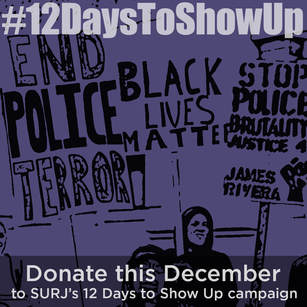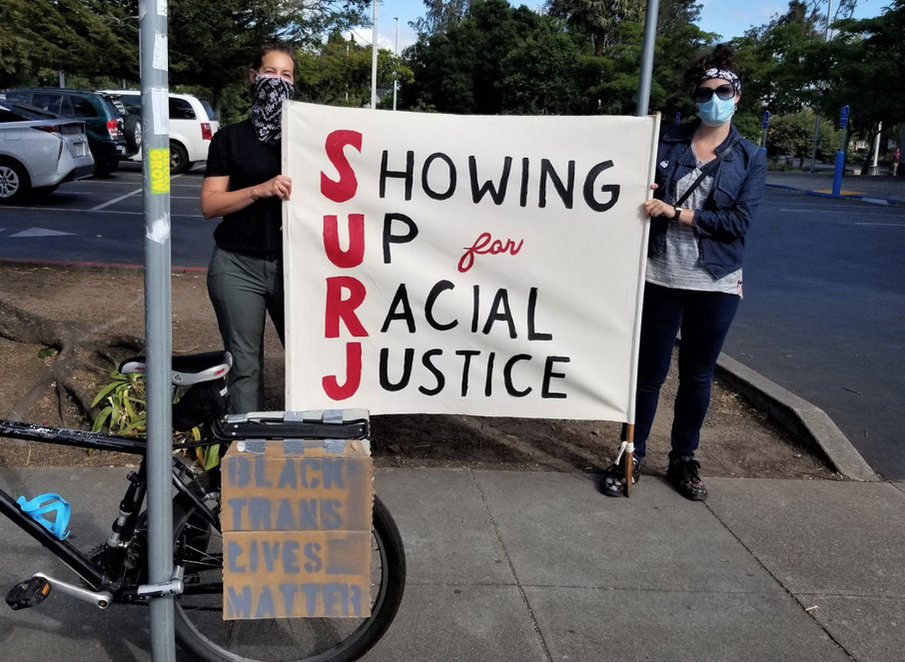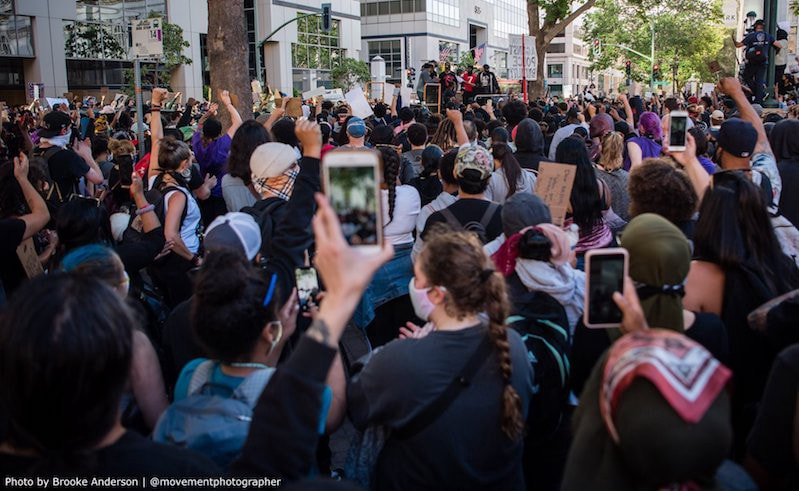|
By Micki Luckey The numbers coming out of Gaza are numbing — over 33,000 dead, almost half children; 17,000 orphans; already 20 dead of starvation and many more expected; 80% of the population displaced… Many of us in SURJ Bay Area have been marching and demonstrating, signing petitions, sending emails, and making phone calls to protest the assault on Gaza now entering its sixth month. We follow the actions recommended by our partner, Arab Resource and Organizing Center, as well as our allies at Jewish Voice for Peace. Another organization that supports Palestine is the Middle East Children’s Alliance (MECA). MECA is located in Berkeley and provides on-the-ground support in Palestine as well as other parts of the Middle East. Below is the voice of one of their workers. Veronica Oberholzer and Micki Luckey This blog addresses those of us who have put SURJ aside or who have minimized our participation, whether we’re feeling over-taxed, not sure how to re-engage, or unsure how to manage a level of engagement that maintains a satisfying level of participation. After the white supremacist murders in Buffalo, SURJ National Director Erin Heaney wrote, “Today, like so many days in America — a country plagued by racist violence — we are all asking ourselves what to do in response.” Are you satisfied with your response, or are you looking to deepen your engagement with racial justice work? Since this timeline was published there have been a lot of changes as organizers reassess the timeline needed to repeal California’s Three Strikes Law. Stay tuned for more information about how to get involved coming in early 2022. It’s time to repeal California’s Three Strikes law. This unjust 1994 law made it mandatory for anyone convicted of three felonies to serve 25 years to life if any two of the crimes were considered serious or violent. The result was a tidal wave of life sentences that have disproportionately affected African American, and mentally ill and physically disabled defendants, costing taxpayers billions of dollars each year. Learn more about this law here.
SURJ Bay Area partner organizations CURB and Initiate Justice have formed the Repeal California’s Three Strikes Law Coalition with organizations across the state to put an initiative to repeal this law on the California ballot in November 2022. But how does change like this move from idea to reality? The short answer is through a lot of grassroots organizing and hard work! The process began in May 2021 with polling to test the concept with the electorate and determine how much work was needed. Then, the Coalition wrote the language for the proposed ballot measure in June and submitted it to the Attorney General’s office for a ballot title and summary. By Felicia Gustin As thousands of white people join protests nationwide, it’s important to look at not just why people are showing up but also how. Given this nation’s history of racism, we, as white people, want to make sure we are part of the solution, not the problem. As we practice physical distancing and continue the fight against the structural inequities of our society, we must persevere through the leadership and guidance of our local Black, Indigenous, and People of Color communities. Now more than ever, we must rely on mutual aid, mutual dependence, and solidarity.
SURJ Bay Area is taking a critical step forward by creating a Racial Justice Emergency Relief Fund. 100% of donations will be passed on to local organizations providing critical immediate aid to our most vulnerable communities while continuing to fight the structural inequities that turned a novel virus into a global emergency.  #12DaysToShowUp, Donate to SURJ's 12 Days to Show Up campaign. Background image courtesy CRC Media. #12DaysToShowUp, Donate to SURJ's 12 Days to Show Up campaign. Background image courtesy CRC Media. In 1969 Fred Hampton Sr, the 21-year-old charismatic chairman of the Chicago Black Panther Party, was targeted and killed by the FBI in a raid organized by the Cook County State Attorney. Law enforcement carried out the raid and murders after several months of media coverage blasting the the Black Panther Party as “Wild Beasts”, and the FBI issuance of internal memos deeming them a “major threat” to the country. The FBI was committed to dismantling the Black Panther Party “by any means necessary.” We look back at that time and those events in disgust and awe. However, we know that targeted repression of Black resistance is unquestionably NOT a thing of the past. We need only look at a 2017 FBI internal report entitled “Black Identity Extremists Likely Motivated to Target Law Enforcement Officers” which seems to have been used to justify surveilling and jailing a black activist — severely disrupting his life — based solely on his Facebook posts calling out police brutality.  #12DaysToShowUp, Donation this December to SURJ's 12 Days to Show Up Campaign #12DaysToShowUp, Donation this December to SURJ's 12 Days to Show Up Campaign The rapid displacement of Black, Brown, and poor community members has subtly altered the role of police in the Bay Area. Until the 1960s, many Bay Area cities had “Sundown” laws, which allowed police to arrest any person of color after dusk. While these laws are no longer on the books, the Oakland-based Anti Police-Terror Project (APTP) notes that related tactics are still in place. In the current era, police continue to selectively patrol upscale and “up and coming” neighborhoods, and over-patrol poor neighborhoods. In this way, Bay Area police violently reinforce the status quo of white supremacy in our communities. The recent Oakland Police pay raise without public input and the stalling of California’s Police Use of Deadly Force (AB 931) bill are further evidence that police unions hold undue sway in the democratic process, often sidelining the voices and needs of communities of color to make way for increased police power and influence. By Felicia Gustin
We are all feeling outrage over the cruel and inhumane immigration policies that separate families at the border. Trump’s Executive Order is a smokescreen, a distraction, and we have to keep up the pressure. Now is the time to do something. You can turn your anger into action. Do one thing today. Do several things this week. Join with others because collectively we are stronger. Here’s a consolidation of the many lists floating around to give you more information on what can be done. |
Find articles
All
Browse by date
July 2024
MEDIUM |
© COPYRIGHT 2017-2024 SURJ BAY AREA. ALL RIGHTS RESERVED.





 RSS Feed
RSS Feed